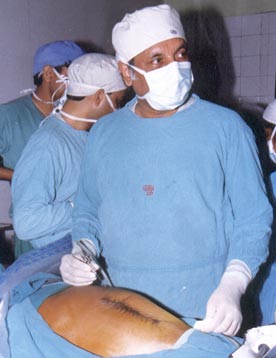We, Indians, have nowadays changed our traditional dietary pattern and are behind the high calorie low fiber foods. In addition, most of us are engaged in a career that hardly requires any physical activity. The dramatic changes in our lifestyle have resulted in ruining our health day by day.
Just imagine! Do we have the strength that our grandparents had?
Compare our resisting power with that of our parents and grand parents!!
We have made ourselves easily susceptible to the attack of various health disorders. One of the important health disorders that a majority of the world population suffers from is OBESITY.
How to get rid of obesity?
A clear understanding of the basics of fat cell development is required to treat obesity.
Let me walk through the process of fat cell development and the various factors affecting it.
Fat cell development:
Obesity occurs due to the eventual deposition of excess fat in the body. This may result due to an imbalance between the calorie intake and calorie expenditure. Hence the intake of calories greatly depends upon the physical activity of the person.
The excessive calories are converted into fat and are stored in the fat cells. The body fat content of a person depends upon the number and size of fat cells. The fat cells multiply in number only during the stages of growth, which means, till puberty. After this age there will only be increase in the size of fat cells. When an obese person loses his fat, the fat cells get decreased in size but not in number. The number of fat cells remains the same.
Factors affecting body weight:
v Genetics: Genetics has a vital part in obesity. When both the parents are obese, the child born to them have a higher chance of becoming obese. In the same way, some people are genetically prone to gain more body weight than others.
v Set point theory: Many of the physiological variables such as blood, glucose, and blood pH and body temperature play an important role in altering the body weight. The hypothalamus and other regulatory centers constantly monitor and control the reactions so as to maintain equilibrium in the body. The set point theory is not proven yet but it focuses on the fact that the body somehow stabilizes the body weight. This might be by the way of genetics.
v Excessive consumption of food: Diet is considered as one of the factors influencing the body weight. As indicated earlier, the energy intake should solely depend on the energy expenditure. Diet restriction is not going to yield any significantly results unless it is accompanied by physical exercise. Most of the obese people tend to complain about the diet therapy. But it is very essential to focus on burning the fat deposited in their body by exercising.
v Inactivity: This is the most threatening factor that most of the individuals of present scenario are facing in their daily fife. The changing life style has eventually resulted in including inactivity as an important factor in increasing the body weight. In spite of reducing the food intake, the resulting body weight could only be achieved by spending the consumed calories in the form of burning energy. Watching television not only reduces the total activity but also lowers energy expenditure. Moreover, it reduces the time spent on other physical activities.
The extent of losing the body weight depends upon the factors such as extent of overweight, age, health, and genetic makeup. Overweight can also be in other ways beneficial and such type of obesity is termed as “healthy obese”. Actually a person’s total body weight is composed of water weight, bone weight, muscle weight and fat weight. If the excess body weight is contributed by fat, then this type of obesity is harmful to the body since it leads to many diseases. Hence the same weight loss diet could not be used as a source of treatment for all the obese people. The extent of weight reduction also depends upon the excess fat content stored in the body.
Common procedures followed in losing weight (unhealthy ways):
Diuretics and other pills:
Diuretics have the capability of removing the water from the body. The major disadvantage of this mechanism is that obese individuals usually have very less amount of water stored in their body since a majority of the cells contain stored fats. This method has been termed as a temporary method of losing healthy body weight because of its disadvantage of causing dehydration and mineral imbalances.
The other medications that are used for reducing the appetite and thereby reducing the body weight are amphetamines, tetrahydrolipostatin and so on.
Surgery:
Surgery is done with gastric partitioning that either reduces the capacity of the stomach to hold the food or reduces the size of the stomach outlet that delays the passage of food from the stomach to the intestine. This procedure reduces the intake of food but is found to result in many complications. Liposuction is another procedure used to remove excess body fat from specific areas of the body in order to regain the lost body shape. The surgical treatments are very expensive in nature.


Very Low calorie diets:
In most of the cases, a well balanced, nutritionally adequate, very low calorie diet is prescribed as a means of treatment, which has more harmful effects than benefits. Let’s see the physical consequences of very low calorie diets.
The major effect of this type of diet is easily reflected in the blood components. The blood carotene, urea, and cholesterol concentrations increase. As a result, there is a sudden decline in blood pressure, carbon-dioxide production, cardiac output, pulse rate, respiratory rate and oxygen consumption rate. Also, the heart beat becomes irregular and heart muscle atrophies are significantly found to occur.
With regard to the digestive system, the motility of the gastro-intestinal tract declines resulting in nausea, vomiting, diarrhea, abdominal discomfort and constipation. Also, gallstones and kidney stones appear. Liver inflammation and fibrosis are also found. The deficient supply of calories also results in menstrual irregularity and loss of sexual interest. Immunity is declined as a result of a reduction in white blood cells in the body.
A diet deficient in calories is the causative factor for the alterations in the body such as development of ketosis and gout, lean body tissues are lost leading to muscle wasting, dehydration, and nitrogen balance becomes negative due to the utilization of proteins for the need of energy. These are the biochemical changes that occur within the body, which after reaching a considerable level, is manifested physically in the form of the following symptoms:
· Headache
· Hair loss
· Fatigue and loss of stamina
· Drying of skin
· Increased body and breath odor
· Easily affected by infections
· Sleeplessness
· Sudden death might occur
Even the concept of very low calorie diets (800 calories) might sound very simple when observed as a treatment measure for obesity; it is also very risky if not followed under proper guidance of an expert. I have a simple six-step procedure that can be followed so as to achieve the weight loss goal in a healthy manner.
Six easy steps to lose weight in a healthy way:
The process of weight loss in the body should be a gradual process. Any remarkable reduction in the body weight could not be considered as a healthy way of losing weight. Thus, before indulging in body weight reduction, the following steps should be considered.
- Knowledge of total calories that is required by a person:
The Indian Council of Medical Research (ICMR) has recommended the calorie intake for Indians belonging to a particular group depending on their age, sex and physical activity. The ICMR recommendations are as follows:
|
|
Sedentary work (Kcal/day) |
Moderate work (Kcal/day) |
Heavy work (Kcal/day |
|
Man |
2425 |
2875 |
3800 |
|
Woman |
1875 |
2225 |
2925 |
2. Reducing the intake of calories:
There is a common myth that a diet that has negligible amounts of carbohydrates and fats is given in order to achieve weight loss in a healthy way. This way of losing the body weight is very harmful to the body. It is because of the fact that when the carbohydrate intake is very less, the body starts extracting energy from the storage sources of the body such as glycogen and fat. During the depletion of stores in the body, water will also be removed in a considerable amount. This results in dehydration and wasting of the body muscles. The body becomes weak and immunity is depressed. Hence over restriction of calories is not recommended as a healthy way of losing excess body weight.
3. Increasing the protein, fiber and other nutrient intake:
In order to prevent extreme wasting of the muscles due to protein deficiency, the calorie restricted diet should be made rich in protein and other nutrients. This will keep up the level of immunity of the individual. Also the vitamins and minerals do not contribute to energy, are well known protectors of the body from diseases.

4. Consumption of meals in regular intervals:
Instead of having three full meals, it is better to take six small meals at frequent intervals. This will inhibit the consumption of excess food.
5. Regular exercise:
A regular walk for 30 to 60 minutes will burn the unnecessary calories and keep your body fit and healthy. Thus exercise serves as one of the important step in the weight loss program. This proves that a mere diet restriction is not enough to bring down the body weight to the desired level. Strenuous exercise is not recommended.
6. Regular weight checkups
Maintaining a record of the body weight and the foods included in the diet will be of great use for following a regular calorie restricted diet and also to know the improvements in the treatment.
Hope this article would have been beneficial for all the readers!